Students at Raac schools fear they are 'kissing top grades goodbye'
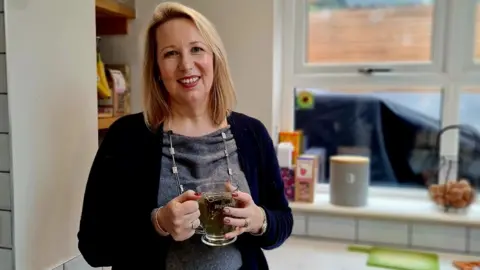 Rahib Khan BBC
Rahib Khan BBCPupils at schools in England that are partially closed because of dangerous concrete say the disruption has left them fearing for their futures.
Students have been unable to access design and technology work rooms, laboratories and other specialist spaces since September due to Raac.
Some have had to switch courses months before their GCSEs and miss out on required science experiments - but the government says it will not change exams as a result.
Nicola Cook said her son, a Year 13 student at St Leonard's Catholic School in Durham, told her he was "kissing his A*s goodbye" and was worried he would not get the necessary grades for his chosen university.
"It's really heartbreaking," she said.
"I just have no answers. I can't solve the problem myself as one parent - none of us can."
Ms Cook's son moved to the school because of its provision for pupils with special education needs and disabilities (SEND), which are now not matching her expectations.
She said the school had done an "outstanding job", but the situation is "as bad as you can imagine, and then worse.
"We need the government to come together and to really understand what the impact of this is."
School leaders have called for special consideration for affected students.
The Department for Education (DfE) said it was "not possible to make changes to exams and assessments for only some groups of students".
A total of 231 schools in England were confirmed to have Raac, or reinforced autoclaved aerated concrete, in the most recent government list issued last month, but that list could continue to grow.
Raac is a lightweight material that was used mostly in flat roofing, but also in floors and walls, between the 1950s and 1990s. It is a cheaper alternative to standard concrete but has a lifespan of about 30 years.
However, this short lifespan means its use in permanent buildings has caused problems.
Over the summer, a Raac panel that would have been classed as "non-critical" collapsed at a school in England, prompting the closures.
'I cried... it was worrying'
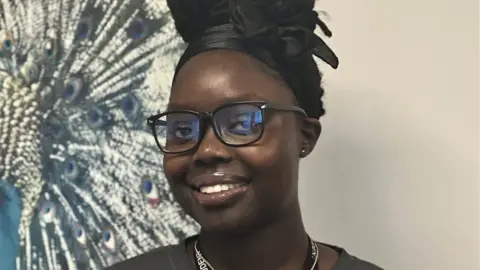 Shoeburyness High School
Shoeburyness High SchoolMary, 17, said she was worried about how a lack of specialist equipment and rooms will impact her plans to study architecture.
She told the BBC she was shocked when students were told about the classroom closures at the start of the school year.
"I cried... it was very worrying," she said.
"This will affect us for the whole of our course," said fellow student, Amelia, 17. "It's not just going to be a little problem - it's a big problem."
Schools have different ideas about what any extra help should look like.
Those ideas include assessing pupils' grades on a case-by-case basis or schools being given a blanket percentage increase on their results. Others favour returning to teacher-assessed grades, which is what happened when exams were cancelled during the pandemic
Prof Stephen Gorard, of the University of Durham, who has produced a report on the impact of Raac on the school's pupils, said some parents had moved their children to other schools.
He told the BBC that, compared with pupils elsewhere, students at those schools impacted by Raac "are going to be disadvantaged for their assessments".
"The difficulty lies in deciding to what extent that has happened. But clearly it is not a desirable situation," he said.
"I think anybody who's seen these schools will know that disruption is bad."
St Leonard's has called the situation "extremely challenging", adding that bad weather had further delayed the instalment of temporary classrooms and rebuilding work.
It said it was in discussions "to ensure our students are not disadvantaged through this unprecedented situation" and would be asking for special consideration.
Shoeburyness High School in Essex was aware of the presence of Raac in its design and technology block months before the school was added to the government's official list.
Work to remove the concrete has been pushed back to Easter, which the school says would have been too late for GCSE design and technology students to complete the required practical work.
Rather than waiting for an extension that might not be allowed, the school switched the students to 3D design, a different GCSE course.
"It's very, very difficult part-way through a course to be told you suddenly don't have an option that you had before," said Ben Stickley, CEO of Southend East Community Academy Trust, to which Shoeburyness High School belongs.
"We'd never want to do that, but what we're looking at is the least-worst option for them."
The school has asked for an extension for its A-level 3D design students, who have been using rulers and utility knives because they are unable to access the laser cutters typically used by students in other schools.
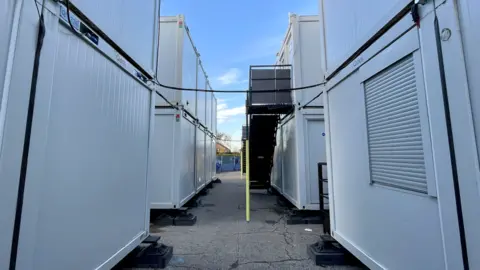 Hazel Shearing BBC
Hazel Shearing BBCSome schools with Raac on site had to close entirely and teach students remotely, after they were told buildings were unsafe, days before the start of the autumn term.
The vast majority of schools - 228 - are reported to be back to face-to-face learning, but how that works in practice varies depending on how much Raac is present on site - and where it is.
The BBC has spoken to schools that have been teaching children in marquees, portable classrooms, sports halls and corridors. Some establishments have had to increase class sizes, or even ferry students to off-site venues.
Schools are concerned about the loss of specialist spaces which cannot be easily replicated, such as technology work rooms, science labs, sports facilities, toilets and canteens. Many playgrounds and sports areas are out of action because it is the only place to erect portable classrooms.
Hadleigh High School in Suffolk is currently unable to access any of its six science labs. Pupils who should be conducting experiments with Bunsen burners and test tubes are instead learning theory in two-storey portable classrooms.
"They're cold, they're echoey," said Sarah Skinner, CEO of South Suffolk Learning Trust, of the temporary classrooms on site.
"We're trying to be fair, so that not everybody teaches permanently in a cold classroom... but that means no one 'owns' a classroom. There's nothing around the walls. It's very uninspiring.
"It's not how we teach at this school - we get great results," she added.
"It's disappointing, but the children are better with us than at home."
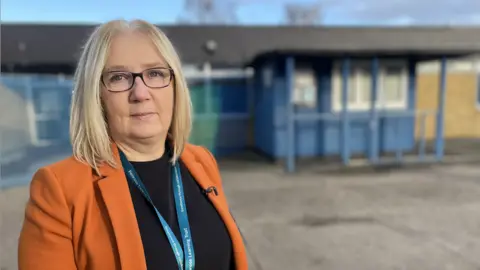 Hazel Shearing BBC
Hazel Shearing BBCThe school has considered sending students to lessons in science labs at other local schools, but in such a rural area it would mean pupils spending large chunks of the day travelling.
School leaders even considered, at one stage, whether art rooms could be used for dissections because they too have sinks - but it was not possible.
"I would like the exam boards to understand that our children have not had [the] specialist provision that every other child they're competing with in the exam season has had," said Ms Skinner.
'Every step possible'
The DfE said: "It is not possible to make changes to exams and assessments for only some groups of students to address the impact of variable disruption to teaching.
"We are working closely with affected schools to ensure the best possible education for pupils and taking every step possible to remove any obstacles to learning through mitigations including temporary accommodation and in some instances use of specialist facilities in off-site accommodation."
In a later statement, it also said it had asked exam boards to agree to coursework extensions where possible.
The Joint Council for Qualifications (JCQ), which represents exam boards, said it had advised affected schools to "get in touch with their exam boards for support on a case-by-case basis", while Ofqual, England's exams regulator, said it had told exam boards to prioritise those schools with Raac that contact them.
JCQ guidance states that "candidates will not be eligible for special consideration" as a result of "quality of teaching, staff shortages, building work or lack of facilities".
Cas Evans, the head teacher at Parks Primary School in Leicester, has bought an electric scooter to speed up her commute so she can check up on pupils who are learning in a nearby council building.
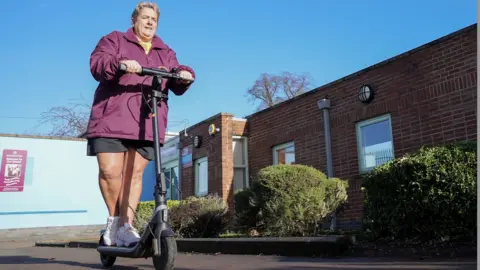 Gemma Laister BBC
Gemma Laister BBCThe school has been bringing in hot meals from a nearby school - but only three times a week.
She said portable toilets initially posed a problem for younger children, some of whom "who were not going to the toilet for the day".
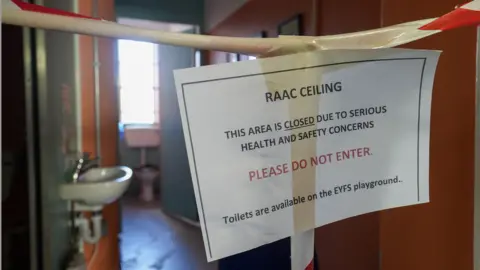 Gemma Laister BBC
Gemma Laister BBCMs Evans said temporary classrooms cannot come soon enough.
"We miss each other, you know?" she said.
"One of the strengths of this school is the togetherness of the community, of the staff, of the pupils.
"We will be delighted once we're back all together."
Additional reporting by Rahib Khan and Barry Gibson
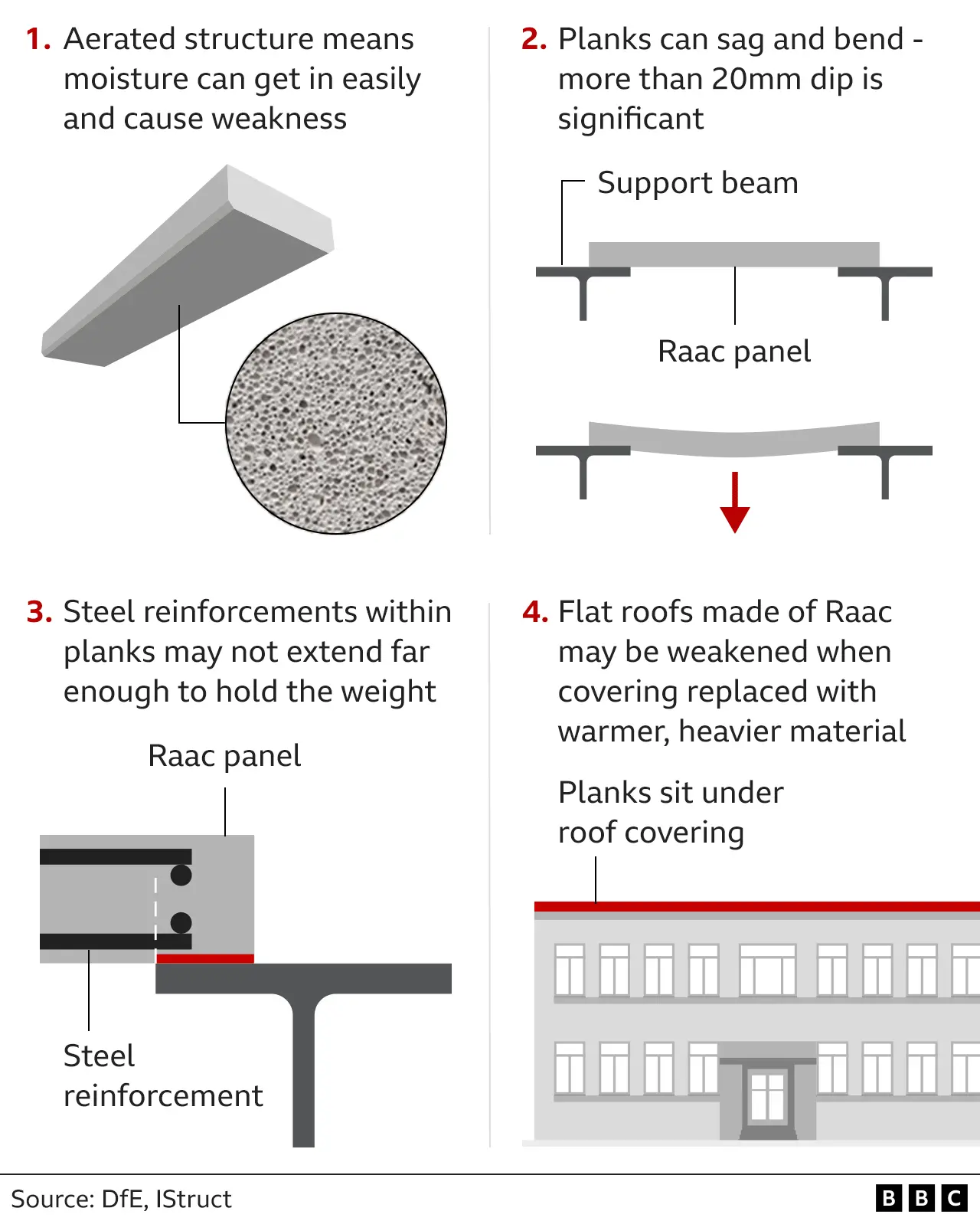

Are you personally affected by the issues raised in this story? Share your experiences by emailing [email protected].
Please include a contact number if you are willing to speak to a BBC journalist. You can also get in touch in the following ways:
- WhatsApp: +44 7756 165803
- Tweet: @BBC_HaveYourSay
- Upload pictures or video
- Please read our terms & conditions and privacy policy
If you are reading this page and can't see the form you will need to visit the mobile version of the BBC website to submit your question or comment or you can email us at [email protected]. Please include your name, age and location with any submission.
